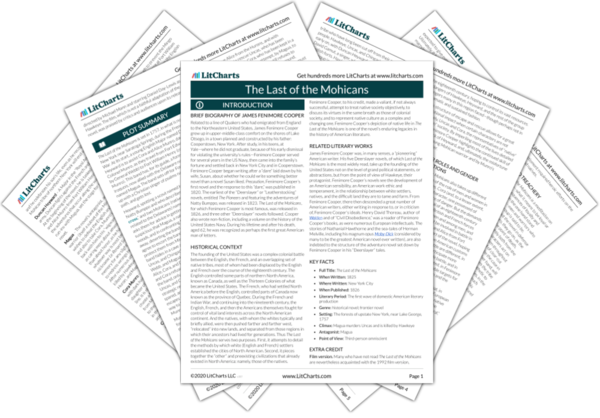Summary
Analysis
Heyward returns from Montcalm’s camp, and finds Munro seated with his two daughters within Fort William Henry. Munro and his daughters have been speaking happily to one another, and though Heyward is loath to interrupt this scene of “domestic bliss,” he nevertheless does so, in order to bring news of the meeting with Montcalm. Munro sends his daughters away, and, alone with Heyward, asks him, first, whether Heyward has any “designs” on his daughters. Munro makes sure Heyward knows that he (Munro) is receptive to those designs. Heyward, surprised that Munro wants to talk about marrying off his daughters before hearing of the battle-plans, goes on to say that he wishes to propose to Alice.
Here, Fenimore Cooper shows that ideas of marriage and society are never far from members of the English nobility, even during times of total crisis. Munro is so concerned for the safety of his daughters because he is concerned, in part, about the survival of his family, into which he hopes Heyward will marry one day. Heyward is a gentleman himself and a soldier, and because he is already Munro’s friend, Munro would be happy to welcome him into the clan.
Themes
Munro is surprised; he had assumed that Heyward wished to marry Cora. Munro says he will have a much harder time parting with his daughter Alice, and asks Heyward to sit, so he (Munro) can tell Heyward the story of his two daughters. Munro, as a young man in Scotland, was to marry a woman named Alice Graham, but Graham’s father did not approve. Thus Munro went to the West Indies as a soldier, where he ended up marrying another woman, distantly descended from one of the African peoples brought to the West Indies as slaves to wealthy Britons. Cora, the daughter of this, Munro’s first marriage, therefore carries “in her blood,” according to Munro, the “passionate” nature of those West Indian groups.
An intriguing backstory, if only for its social and political implications. The idea that Cora could not be brave “on her own,” but instead would need to have this bravery attributed to a “foreignness” of character, is somewhat in line with the racial politics of the novel—although Fenimore Cooper himself was rather liberal, for his time, in his esteem for the culture and practices of non-white inhabitants of the Americas. Nevertheless, it is perhaps disappointing to a modern reader to have Cora’s individuality reduced to a kind of sum total of her ethnic backgrounds.
Themes
Literary Devices
Munro’s first wife, however, then died in the West Indies, and he and Cora moved back to Scotland, where Munro found that Alice Graham had waited for him for twenty years—Munro then married Graham, and had another child, Alice. Thus Cora and Alice are half-sisters, and the differences in their temperaments and hair colors are explained by their different mothers. Munro intimates that he has a particular relationship to Alice because she is the only daughter of his beloved Alice Graham, whose patience Munro has come to idealize over the ensuing years (Alice Graham also passed away, when Alice the daughter was young).
Alice, too, has her timidity and shyness traced to her having a timid, devoted woman for her mother. What is less clear is why Munro, having announced just this biographical data, would then have trouble with Heyward marrying Alice. Perhaps Munro is simply protective of Alice, considering her to be more “naturally” his heir; perhaps Munro simply believes that Heyward and Cora, in their respective bravery, would make a better match
Themes
Suddenly, however, Munro snaps out of his sadness and asks, in an officious voice, if Heyward has news from Montcalm’s camp—Heyward understands this to mean that Munro wishes to suspend, for a time, talk of these personal matters. Heyward relates his conversation with Montcalm to Munro, and Munro realizes that Montcalm was offended Munro himself did not come to have the “parley”; thus Munro resolves to meet with Montcalm in person, outside the camp. He and Heyward walk out, under British guard, from the fort and approach Montcalm.
In keeping with the overlap of military and personal matters, Munro turns quickly to the battle at hand, and announces that he will have a talk with Montcalm himself. Munro seems to expect that Montcalm will have a different story to tell him than he told Heyward, perhaps because Heyward was a subordinate, and this offended Montcalm’s vanity.
Themes
Get the entire The Last of the Mohicans LitChart as a printable PDF.

Montcalm speaks with Munro, again saying that the British have been overwhelmed by French forces. Munro, indignant, replies that Webb will be sending reinforcements from Fort Edward, but Montcalm, now quite proud, shows Heyward and Munro a letter, intercepted from the British and signed by Webb, stating that Webb considers Fort William Henry to be lost, and that, therefore, Webb will send no reinforcements. Munro is crushed by this news, and he realizes that he will have to abandon the fort to the French. He leaves Montcalm, dejected, and allows Heyward to arrange the truce with Montcalm; Montcalm promises that the British and their dependents in the fort will be allowed safe and orderly passage through enemy lines to their own (British) territory, after the hand-over of the fort is accomplished.
A sobering moment for Munro and for the fort. Webb, who is never actively described in the novel, becomes famous in the book not for his treachery but for his lack of sympathy, for his fellow Englishmen. Webb perhaps believes that Montcalm is incapable of the kind of failure of oversight that will allow the impending massacre outside the fort, at the hands of the Hurons; perhaps Webb is simply too concerned with other aspects of the war to care very much about Heyward and his band. But, in any case, this decision is a momentous one for the course of the narrative.
Themes












